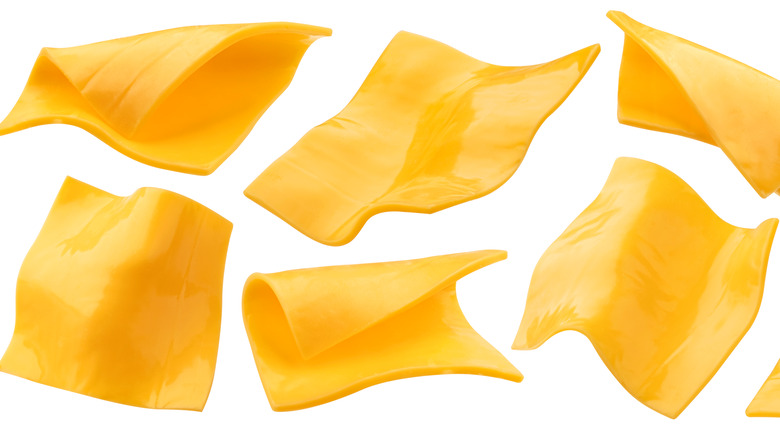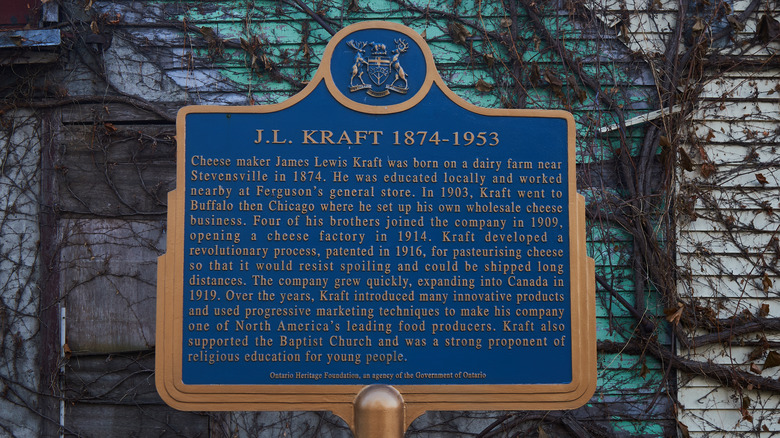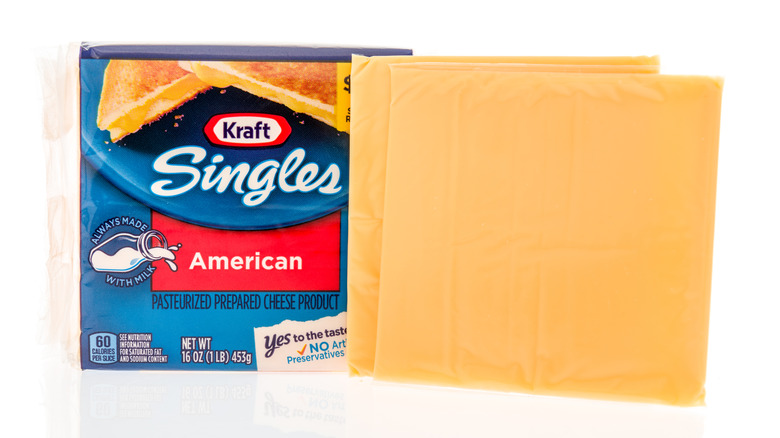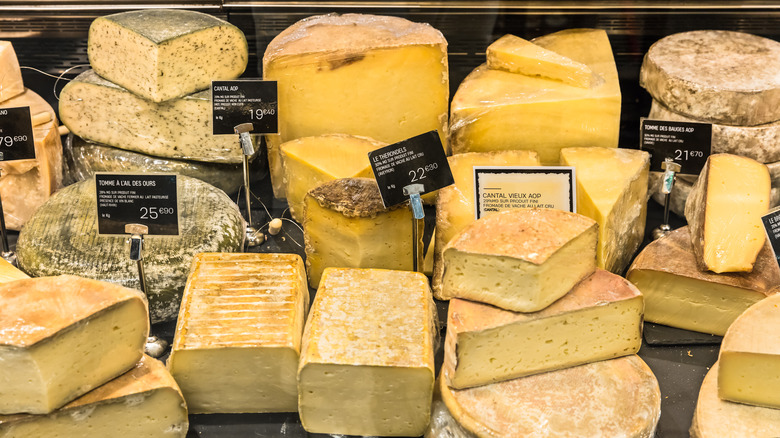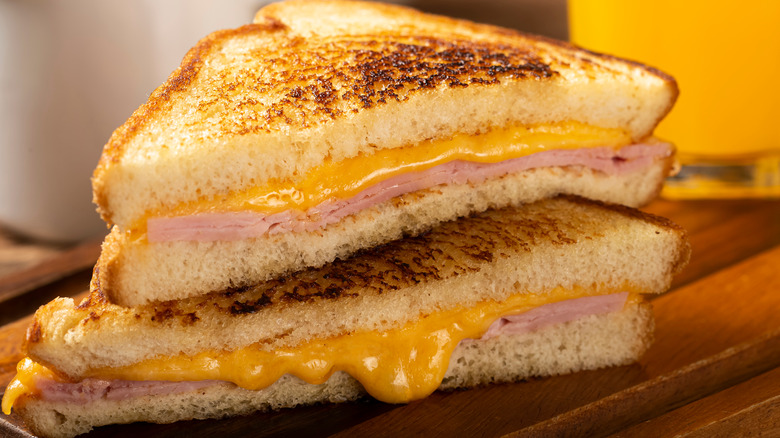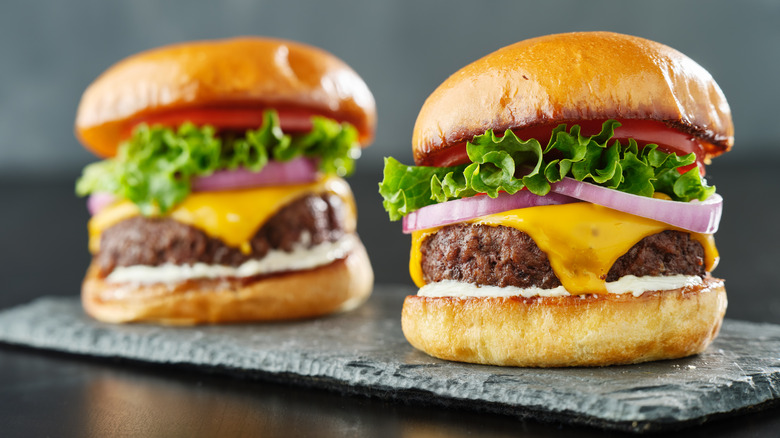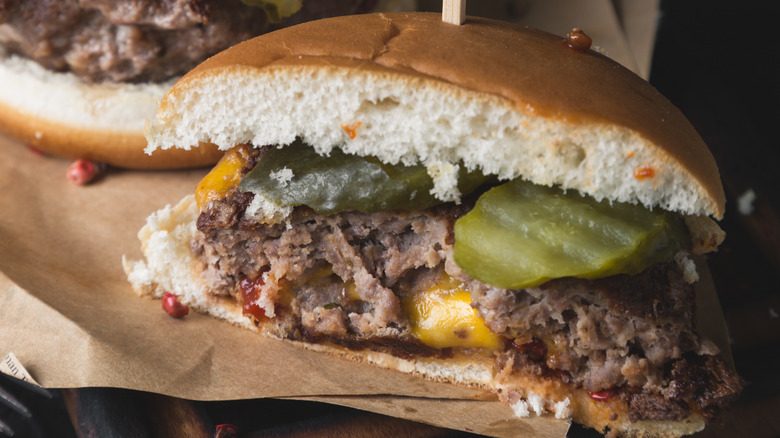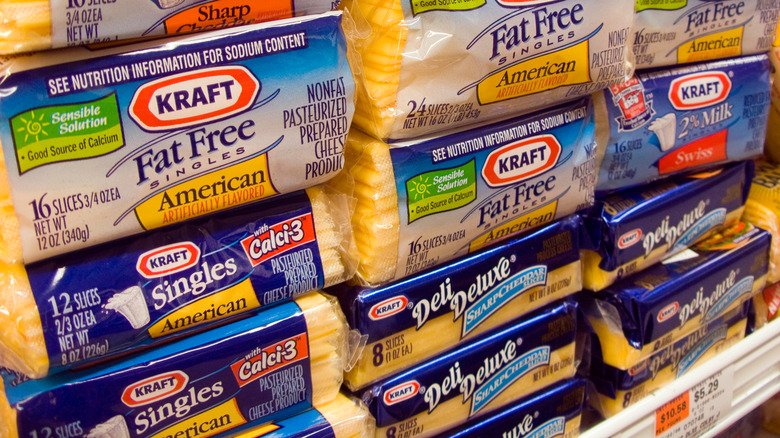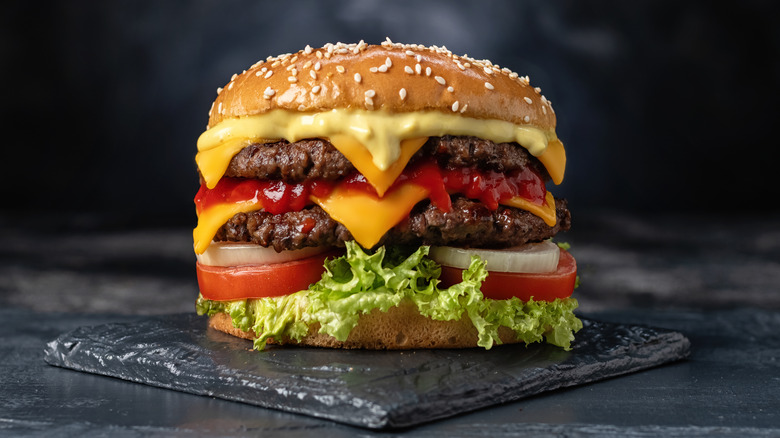The Untold Truth Of American Cheese
It's an essential part of a classic grilled cheese and the element of queso that makes it so melty and delicious (it is, after all, a "super melter," according to Serious Eats). Whether it's bright orange, pristinely white, sold in a huge block, or individually wrapped in plastic, American cheese is a time-honored element of many American recipes –- and diets.
But American cheese has suffered an unfortunate reputation over the years, with sales showing a rapid and continuous decline, according to Bloomberg. Not to mention, numerous claims that it's too processed to be considered cheese at all, passed around among consumers and analyzed by outlets like Taste of Home. But despite what naysayers would have you believe, American cheese remains a stalwart of the culinary landscape, a testament to its rich history. From its invention (by a non-American, no less!) to its fall from –- and return to –- grace, here's everything you never even realized you needed to know about American cheese.
American cheese was invented by a Canadian
Despite its moniker, you may be surprised to learn that American cheese isn't all that American! The story of this cheese begins in Switzerland in 1911, according to the Michigan Dairy Review, when in an attempt to produce cheese with a longer shelf life for export, Walter Gerber and Fritz Stettler combined local Emmental with the preservative sodium citrate. The result was smooth, and the experiment proved successful.
According to the outlet, it wasn't until five years later that the process was patented, albeit not in Switzerland, but rather in the U.S. by Canadian-born James Lewis Kraft (yes, those Krafts). Kraft developed his own version of the Swiss product to extend the shelf life, not of Emmental, but of cheddar. He wrote in his patent claim that he intended to convert cheddar into a shelf-stable product that could be stored without going bad while maintaining the characteristic flavors of the cheese.
Eventually, brother Norman Kraft patented a box lined with metal foil into which the liquid cheese could be poured and then sliced into portioned squares (via Michigan Dairy Review). The resulting product, Kraft's senior director of brand building Anne Field, tells Thrillist, was a practical and portable way to bring cheese to "millions of Americans," including troops stationed overseas during the World Wars.
The original American cheese wasn't individually packaged – or even sliced
Be it the original Swiss product or Kraft's first patented cheese, the first American cheeses lacked what may seem like an essential element of the product as we know it today: the wrapper. Indeed, reports Thrillist, it wasn't until 1944 that Norman Kraft patented the individually-wrapped single-serving American cheese slice.
According to The New York Times, Norman, who had by then become Kraft's head of research, was on the lookout for a way to make his brother's processed cheese product even more convenient for the home consumer. In 1935 he began to develop a solution, experimenting with ways to sell the cheese pre-sliced rather than in block or loaf form. It wouldn't be until 1950 that "Kraft De Luxe Process Slices" -– a stack of eight slices that could be peeled off as needed -– was launched.
It would take another few years, the outlet contends, before Arnold Nawrocki developed the last essential part of this convenience food: the individual wrapper. This invention, launched in 1956, was the start of the individually wrapped Kraft Singles we know and love today.
Some people don't think American cheese counts as real cheese
Despite beginning with either Emmental in the case of the original Swiss product, or cheddar in the case of Kraft's product, per Mental Floss, for some cheese lovers, American cheese is so processed that it can no longer really be considered cheese.
Per the FDA requirements, a product must contain more than 51% cheese curd to be considered cheese. Taste of Home notes that since American cheese is under this cutoff, it doesn't technically pass muster. And according to Mental Floss, the ingredient list for a product like Kraft Singles –- boasting milk, whey, milk protein concentrate, milk fat, calcium phosphate, salt, sodium citrate, whey protein concentrate, sodium phosphate, sorbic acid, cheese culture, enzymes, annatto, and paprika extract –- precludes the product from legally being dubbed cheese.
Indeed, categorized not as cheese but as pasteurized process cheese food by the FDA, American cheese is fairly distinct from other cheeses made around the country and worldwide. Even fans of the stuff, like J. Kenji López-Alt of Serious Eats, acknowledge that American cheese is "not exactly cheese." Where he disagrees with naysayers is whether that's actually a bad thing!
American cheese's processed nature is part of what makes it so delicious
American cheese is a favorite in grilled cheeses, cheeseburgers, and omelets for a reason: When heated, it boasts a velvety, luxurious texture with no stringiness or greasiness. And this characteristic is entirely thanks to its processing –- the very element that leads some to pooh-pooh it!
According to Thrillist, sodium citrate is one of the additives that give it its coveted texture. In addition to extending the shelf life, the outlet contends, the compound makes it creamier, thanks to its powerful emulsifying properties (via Serious Eats). Other emulsifiers like sodium phosphate and preservatives like sorbic acid also contribute to the texture and extended shelf life.
When heating a variety of other cheeses, a stabilizer such as a béchamel sauce is required to keep the cheese gooey and soft, according to Taste. American cheese, on the contrary, doesn't break or split, no matter how many times it's heated and cooled. It's no wonder that Serious Eats dubbed it a "super melter!"
American cheese is the country's second favorite cheese
Trailing right behind cheddar, American cheese is the second-most beloved cheese in the country, according to a 2021 YouGov poll. The poll, which surveyed over 8,000 U.S. adults, found that 19% of respondents picked cheddar as their top cheese choice, followed by 13% for American-style. (Next on the list were mozzarella at 9%, Swiss at 8%, and pepper Jack at 7%.)
It's no surprise that American cheese is so beloved, considering its omnipresence in childhood favorites like grilled cheeses, cheese omelets, velvety queso, or mac and cheese (including this delectable copycat recipe of Chick-fil-A's version). For Serious Eats, American cheese is also the secret to the greatest burgers ever, a feat of American culinary wizardry described as "well-seared patties of loose ground beef, bound together with nothing but a lot of hope and a little American cheese." If that's what it takes, we're in!
American cheese is an integral part of a Jucy Lucy
While American cheese is a happy addition to any burger, there's one member of the category that basically demands it: a Jucy Lucy. This Minnesota staple is known above all for its molten center, a characteristic achieved by stuffing the burger patty with cheese before griddling (via Greatist). And to get it just right, only American cheese will do.
Depending on who you ask, its invention is attributed either to the 5-8 Club or Matt's Bar, according to Thrillist. Basically, the Jucy Lucy (also spelled Juicy Lucy) is an indication of what would happen if you mashed up a Gusher fruit snack and a cheeseburger, the outlet asserts. And while Greatist contends that cheddar is a good runner-up cheese, there's really nothing quite like gooey, velvety American when it comes to this Midwestern classic. Both of the purported inventors, Thrillist reports, use this processed American staple –- and both recommend waiting a minute or two before biting in, lest the geyser of cheese erupt and burn you!
American cheese has been tanking in popularity for years
With American food trends leaning away from processing towards an ultra-natural healthier bent according to GWI, it's perhaps no surprise that American cheese isn't nearly as popular now as it was when it first emerged on the foodie scene. Innovative processed foods like American cheese, canned soup, or freeze-dried onions, once praised for their convenience, are decreasing in popularity, and in 2018, Vox claimed that it may be time to "mourn the death" of the product.
"One by one, America's food outlets are abandoning the century-old American staple," Bloomberg reported, noting that at the time, sales of cheeses like Kraft Singles were experiencing a four-year decline. Spoon University accurately depicted the mindset of many natural-minded shoppers in titling its story on the product with scare tactics: "What is American Cheese? You Really Don't Want to Know." It's no wonder the product has seen a decline in sales.
It is currently experiencing a renaissance, shedding some hope for its future
Nostalgia is a powerful element governing foodie trends, and especially in the wake of the COVID-19 pandemic, people are seeking comfort in their food. It's perhaps no surprise then, that the American cheese of our childhoods is currently bouncing back from its natural-foods-driven fall from grace.
In 2019, Thrillist reported on American cheese's "comeback," noting that while it had indeed experienced four years of declining sales, many popular restaurants including Shake Shack, In-N-Out, and Five Guys continued to rely on the processed cheese –- a stalwart loyalty attributed to its fanbase too.
American cheese isn't relegated merely to chains. Big names in food including J. Kenji López-Alt of Serious Eats, Bon Appétit's Sohla El-Waylly, or "Alex vs. America" host Alex Guarnaschelli have pledged their love of the product. El-Waylly claims that the processed cheese is "non-negotiable" in her homemade queso recipe, and Guarnaschelli tweeted that "someone who doesn't like American cheese is someone you just can't trust."
